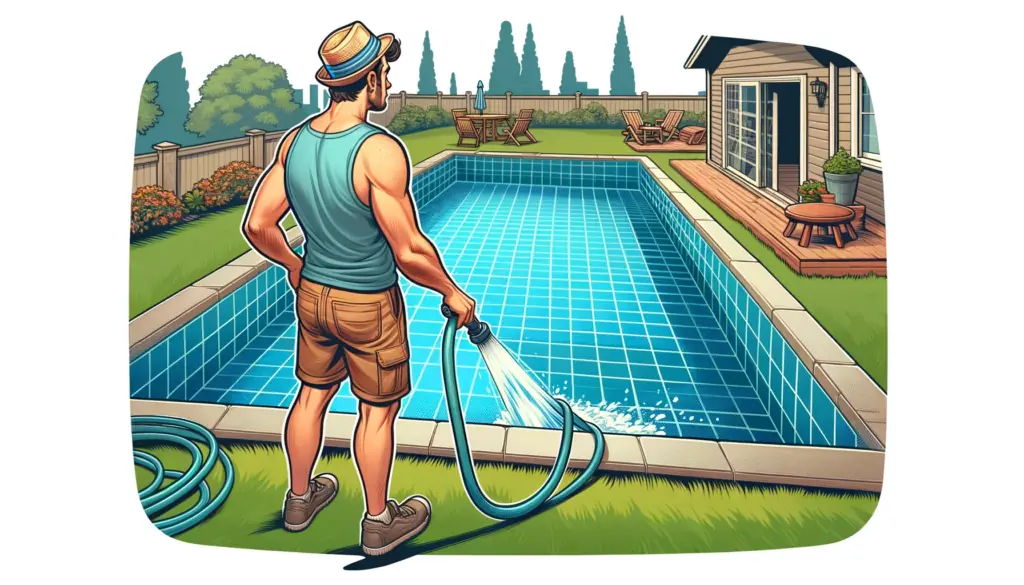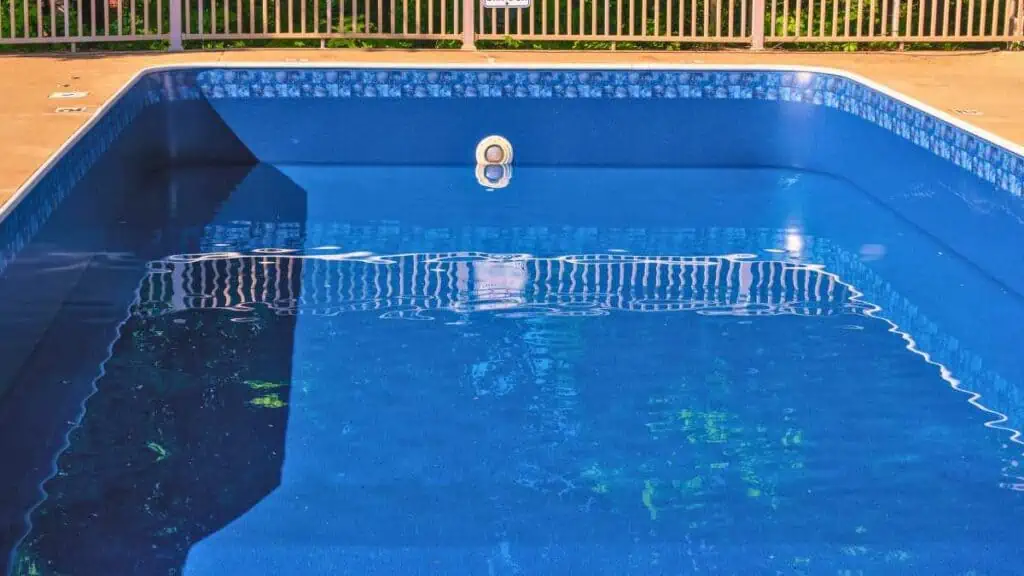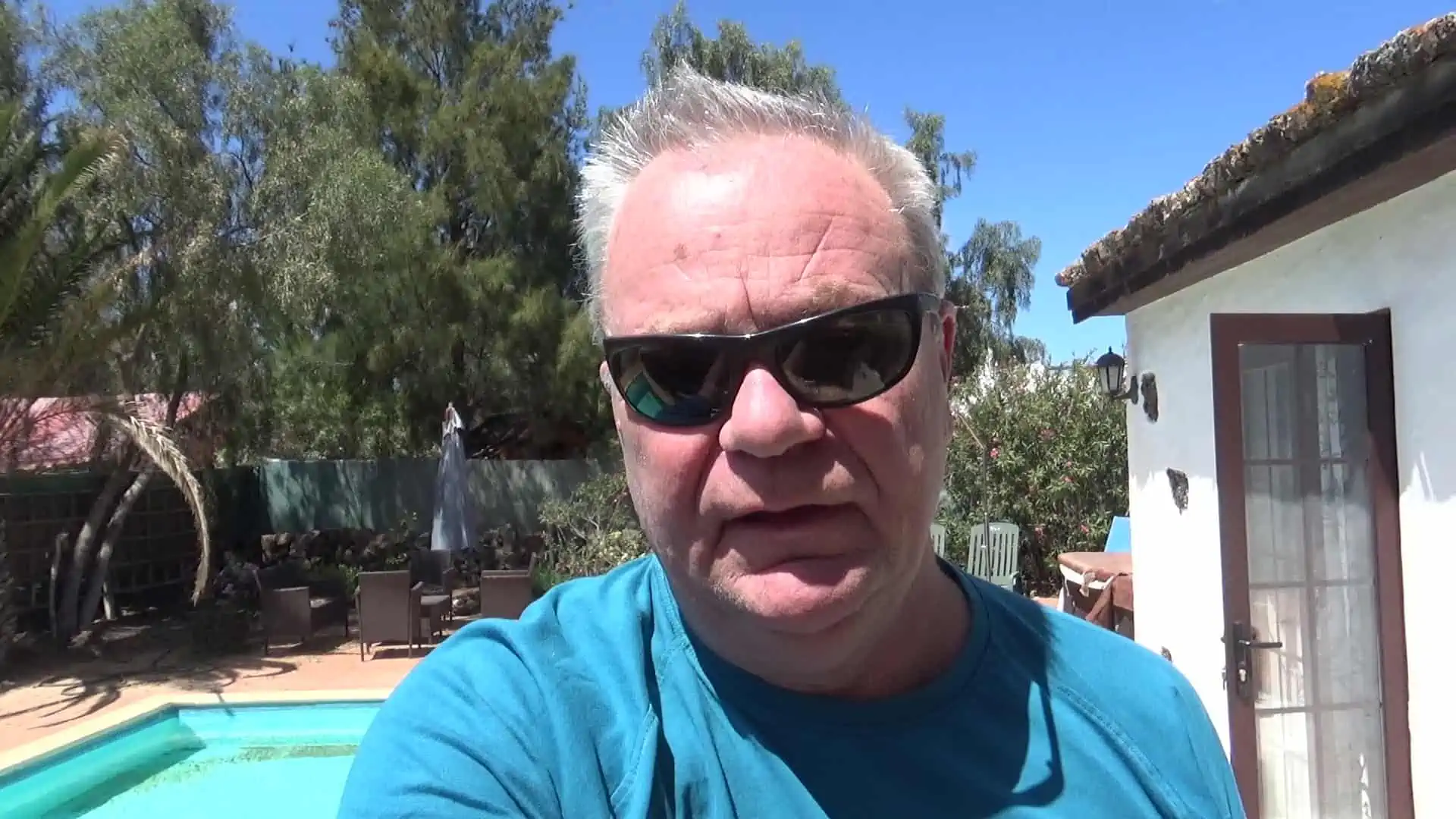Swimming pools are a great way to relax and cool down during warm months, but they also require regular maintenance to ensure water quality and safety for swimmers. One crucial aspect of pool maintenance is determining how often to change pool water.
The frequency with which pool water should be changed depends on various factors, including the pool’s size, daily usage, maintenance routine, and climate.
Experts recommend changing the water in a private in-ground pool every 5 to 7 years, although I disagree with them.
With a well-maintained pool, a good filtration system, balanced chemical levels, and regular cleaning, do you need to change it all? Let’s look into it.

Key Takeaways
- Changing pool water every 5 to 7 years is generally recommended, with the exact frequency depending on factors like usage, climate, and maintenance.
- Proper pool maintenance, including balanced chemical levels and regular cleaning, helps prolong water change intervals.
- The type of pool, filtration system, and environmental factors also influence how often pool water should be changed.
Does Swimming Pool Water Ever Need to Be Changed? My Personal Opinion
This might be controversial, but I have owned my pool for over 11 years and have never changed the water!
My reason is that considering the amount of water lost due to evaporation or when vacuuming to waste, which is then replenished, I would estimate that my pool water is 100% renewed at least once per year.
This doesn’t include the couple of times I have emptied the pool partially and refilled it to reduce the level of CYA.
So, as many experts suggest, you do not need to drain and refill a pool completely every 5 to 7 years. I will only completely drain if I need to work on the pool structure.
Nevertheless, the following explains why many experts suggest changing pool water, which I add should you wish to follow their advice.
Reasons You May Need To Change Your Pool Water
Maintaining a clean and healthy swimming environment is important for any pool owner. While regular maintenance can extend the life of your pool water, there may come a time when a complete water change is necessary.
There are several key reasons why you may need to empty and refill your swimming pool, which are essential for maintaining the health and longevity of your pool.
- Chemical Imbalance: Over time, the chemicals in your pool can become difficult to balance, particularly if Total Dissolved Solids (TDS) levels rise too high. High TDS can reduce the effectiveness of chlorine and other sanitizers, making it harder to keep the water clean.
- Calcium Buildup: High calcium hardness levels can lead to scale formation on the pool surfaces and equipment, which looks unsightly and can damage your pool’s filtration system.
- Algae and Contamination: If your pool has suffered from severe algae blooms or contamination that cannot be resolved through chemical treatment, a full water change might be necessary to restore a safe and healthy swimming environment.
- Repair and Maintenance: Sometimes, emptying your pool is necessary to perform certain repairs, such as fixing leaks, resurfacing, or replacing tiles.
- Water Conservation: In areas with water restrictions, refilling the pool occasionally may be more efficient than constantly adding chemicals to maintain water quality.
- Seasonal Care: In some climates, pools are drained at the end of the swimming season to protect them from damage due to freezing temperatures or to perform annual deep cleaning and maintenance.
Remember, while emptying and refilling a pool can resolve various issues, it should be done carefully and ideally under the guidance of a professional to prevent structural damage to the pool and to ensure proper water balance upon refilling.
Determining the Need for Pool Water Change
General Guidelines for Water Change
The frequency at which pool water should be changed may depend on various factors, including water quality, total dissolved solids (TDS) levels, chemical balance, and pool usage. As stated above, many pool experts recommend changing the pool’s water every 5-7 years.
Maintaining your pool water’s chemical balance and quality is crucial for a healthy swimming experience. Regular testing of chemical levels, such as cyanuric acid, calcium hardness, and the water’s pH, is essential to ensure this balance.
Factors like algal growth, high TDS levels, and water discoloration may indicate the need for a water change.
Regular Maintenance and Its Impact
A well-maintained pool with a proper cleaning schedule can significantly reduce the need for water changes. Regular cleaning, vacuuming, and filter maintenance are essential to keeping your pool’s surface and water in good condition.
The type of filter and its efficiency also play a role in maintaining water quality. There are several types of filters, such as sand, cartridge, and diatomaceous earth (DE).
Each type requires upkeep, and a clean filter system ensures better water circulation and filtration, reducing the need for frequent water changes.
A good pool maintenance routine includes the following tasks:
- Weekly cleaning: Skim debris from the pool surface, vacuum the floor, and brush walls to prevent algae buildup
- Water testing: Test the pool’s water regularly to maintain optimal chemical levels and balance
- Filter maintenance: Cleaning or replacing filter sand, cartridges, or DE media as needed, according to manufacturer recommendations
- Pool pump: Regularly inspect the pool pump and its components, making repairs or adjustments if necessary

Effect of The Environment on Pool Water Change Frequency
The environment plays a significant role in determining how often you should change your pool water. Several factors, such as weather, organic materials, and even the type of pool you have, can influence the frequency of water changes.
In a dry climate, the rate of water evaporation may be higher, requiring you to refill your pool more frequently with fresh water. This can dilute the pool water, and you may need to change it less often.
However, in regions with heavy rain, the water can become overloaded with contaminants, leading to algae growth and green water. In such cases, changing the pool water more frequently becomes necessary.
A factor to consider is your pool’s surrounding landscape. If your pool is near trees or plants, organic materials like leaves and debris can contaminate the water, increasing the chance of algae growth and green water. These factors may also lead to slimy walls in above-ground and concrete pools, requiring more frequent water changes.
The number of users and the frequency of pool usage also impact the frequency of water changes. Heavy use results in a higher concentration of body oils, sweat, and other contaminants, which can cause skin irritation and reduce the effectiveness of sanitizers. In this case, changing the water more often is necessary.
The costs associated with changing the water may vary depending on the size of your pool. For small pools, water bills may not be a significant concern. However, changing the water frequently can lead to higher expenses for larger pools. It’s essential to weigh the costs and benefits when determining an appropriate water change schedule for your pool.
Role of Pool Filters in Water Change
Pool filters play a vital role in maintaining the cleanliness and clarity of your swimming pool water. They are responsible for keeping the water free of debris, and various filtration systems can affect water change frequency.
Cartridge Filters are a popular choice for many pool owners due to their efficiency and ease of maintenance. These filters use a replaceable cartridge that typically lasts 2-4 years and has approximately 2,000 working hours. Clean them when the pressure gauge reaches 8-10 psi above the standard starting pressure. This ensures optimal filtration and may help extend the time between water changes.
Sand Filters are another common type of swimming pool filter. They use sand as the filter media and last 3-7 years before requiring replacement. Sand filters effectively remove debris from the pool water but may require more frequent backwashing to maintain optimal performance.
Glass Filter Media is a more durable and long-lasting alternative to sand filters. With a lifespan of 7-15 years, glass filter media can provide efficient filtration and prolonged water change intervals. However, their higher initial cost may be a drawback for some pool owners.

I have had hot tubs for over 20 years and a pool for the last 11 years. I had to learn how to clean, maintain and fix them the hard way. Since then I have helped many friends and neighbors with their pools and now I want to share everything I have learned with you. About Me




Leave a Reply